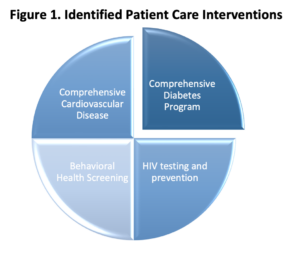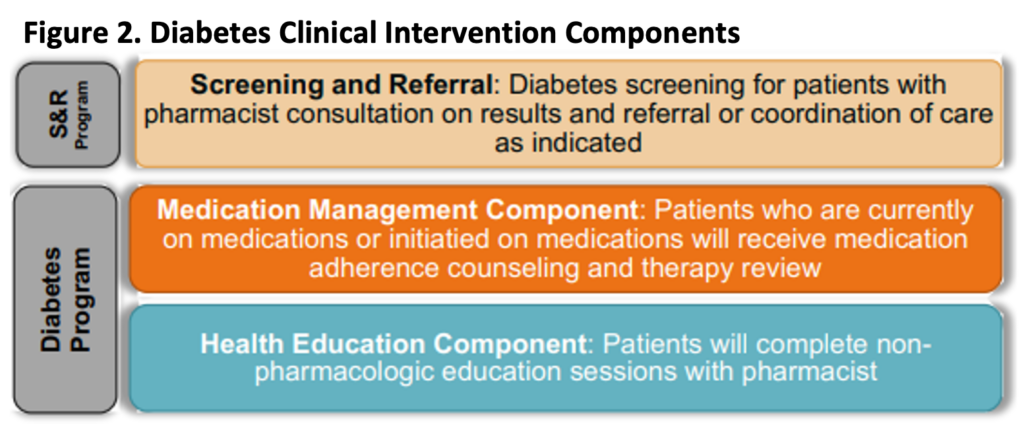By Courtney Humphries
Uncontrolled diabetes is on the rise in America, according to an analysis recently published in the New England Journal of Medicine.1 This is alarming as diabetes, if left uncontrolled, can have devastating effects on the body, leading to kidney disease, heart disease, and vision loss. Diabetes is a chronic medical condition where patients are unable to effectively utilize blood sugar for energy, resulting in elevated blood sugar levels. In the United States,
- Over 34 million adults are living with diabetes.2
- Diabetes is the seventh leading cause of death.2
- It is estimated 1 in 3 adults have prediabetes, which can increase their risk of developing diabetes in the future.3
For both prediabetes and diabetes, symptoms will develop slowly over time and will often go unnoticed by patients; therefore, the US Preventative Services Task Force (USPSTF) recommends screening for all adults 35 to 70 years old at least every 3 years or more frequently based on risk factors.4
To combat the diabetes epidemic in this country, the University of North Carolina Eshelman School of Pharmacy has partnered with the National Association of Chain Drug Stores (NACDS) Foundation to identify and create innovative community pharmacy care delivery models targeting chronic disease states, including diabetes. The project, titled Community-based Value-driven Care Initiative (CVCI), explores the feasibility and effectiveness of four patient-centered, quality-driven care interventions to advance population health (see Figure 1). These interventions are being implemented in diverse community pharmacy organizations to evaluate their feasibility, sustainability, and potential impact on population health.
The diabetes intervention is split into two programs: 1) A screening & referral (S&R) program and 2) A full diabetes program consisting of medication management and health education (see Figure 2). The overall goal for the diabetes screening and referral program is to identify patients at risk for prediabetes and diabetes and to increase access to diabetes care for adults with referral to a diabetes prevention program or diagnosis by physician. The overall goal for the full diabetes program is to optimize treatment through provision of evidence-based medication management and health education practices over a 6-month period.
The diabetes intervention is currently being implemented by two community pharmacy organizations. The first organization is a regional independent community pharmacy chain with 16 locations in eastern North Carolina. Their clinical team is focused on providing this new diabetes intervention in five of their locations. The second organization is a supermarket chain pharmacy with 1,100 locations in the mid-Atlantic area. They will be providing this service in five total locations; four in Virginia and one in North Carolina. The participating pharmacies will begin patient recruitment at the end of this month.
To support sustainability of the diabetes intervention over time, the UNC team has also established an Expert Stakeholder Group (ESG). The purpose of the ESG is to better understand payer population health needs and align those needs with feasible community pharmacy interventions to facilitate a pathway towards sustainability.
Interested in learning more about the project? Follow updates to the project online here and on Twitter @unc_pace.
Courtney Humphries, PharmD is a Community Pharmacy Consultant for the UNC Eshelman School of Pharmacy.
References:
- Fang M, Wang D, Coresh J, Selvin E. Trends in diabetes treatment and control in U.S. adults, 1999-2018. N Engl J Med. 2021; 384:2219-2228.
- What is diabetes? (2020, June 11). Retrieved March 11, 2021, from https://www.cdc.gov/diabetes/basics/diabetes.html
- Prediabetes – your chance to prevent type 2 diabetes. (2020, June 11). Retrieved March 10, 2021, from https://www.cdc.gov/diabetes/basics/prediabetes.html
- Recommendation: Abnormal blood glucose and type 2 Diabetes Mellitus: Screening: United States Preventive services taskforce. (2021, August 24). Retrieved Feb 11, 2022, from https://uspreventiveservicestaskforce.org/uspstf/recommendation/screening-for-prediabetes-and-type-2-diabetes


